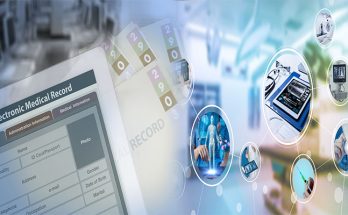Artificial intelligence (AI) is revolutionizing various industries, and its impact on the medical field is particularly promising. With advancements in computer science and machine learning, the integration of AI in medical applications is transforming healthcare delivery and improving patient outcomes. In this article, we will explore how AI is being integrated into medical computer science applications and its potential benefits.
Enhancing Diagnosis and Medical Imaging
One area where AI is making significant strides in medicine is in diagnosis and medical imaging. AI algorithms can analyze medical images, such as X-rays, CT scans, and MRIs, with remarkable speed and accuracy. By comparing patterns in large datasets, AI systems can assist radiologists in identifying abnormalities, detecting early signs of diseases, and making more accurate diagnoses. This integration of AI not only improves diagnostic accuracy but also helps reduce human error and enhances the efficiency of the healthcare system.
Personalized Treatment and Precision Medicine
AI algorithms have the potential to analyze vast amounts of patient data, including medical records, genetic information, and treatment outcomes, to provide personalized treatment plans. By considering individual patient characteristics, such as genetics, lifestyle, and medical history, AI can help identify the most effective treatment options for specific conditions. This approach, known as precision medicine, improves patient outcomes and reduces healthcare costs by avoiding unnecessary treatments and adverse drug reactions. AI-powered systems can also monitor patient responses to treatment, allowing for real-time adjustments to optimize therapeutic outcomes.
Predictive Analytics and Early Disease Detection
Another significant benefit of integrating AI in medical computer science applications is the ability to predict diseases and detect them at an early stage. By analyzing patient data and identifying patterns, AI algorithms can assist in predicting the risk of developing certain diseases, such as diabetes, cardiovascular issues, and certain types of cancer. Early detection enables healthcare professionals to intervene proactively, potentially preventing the progression of diseases and improving patient outcomes. AI can also facilitate population health management by identifying high-risk groups and informing targeted intervention strategies.
Streamlining Administrative Tasks
In addition to clinical applications, AI can also streamline administrative tasks within the healthcare system. AI-powered computer systems can automate processes such as appointment scheduling, medical billing, and coding, reducing administrative burden, improving efficiency, and freeing up healthcare providers’ time to focus on patient care. Natural language processing capabilities enable AI systems to analyze and extract relevant information from patient records, assisting in documentation and creating comprehensive medical summaries.
Ethical Considerations and Challenges
While the integration of AI in medical computer science applications brings many benefits, it also raises ethical considerations and challenges. Data privacy, security, and patient consent are crucial factors that need to be carefully addressed. Additionally, transparency and explainability of AI algorithms are essential to build trust, understand decision-making processes, and ensure accountability. It is vital to balance the potential benefits of AI with ethical principles to protect patient rights and well-being.
The integration of AI in medical computer science applications holds immense promise for the healthcare industry. From enhancing diagnostics and medical imaging to enabling personalized treatment and precision medicine, AI is transforming healthcare delivery and improving patient outcomes. Predictive analytics and early disease detection help identify and manage diseases at an early stage, while streamlining administrative tasks reduces burden and enhances efficiency. However, proper attention should be given to ethical considerations and challenges to ensure patient privacy, data security, and algorithm transparency. With further advancements and collaboration between computer science and medicine, AI has the potential to revolutionize healthcare and create a more sustainable and patient-centered future.





